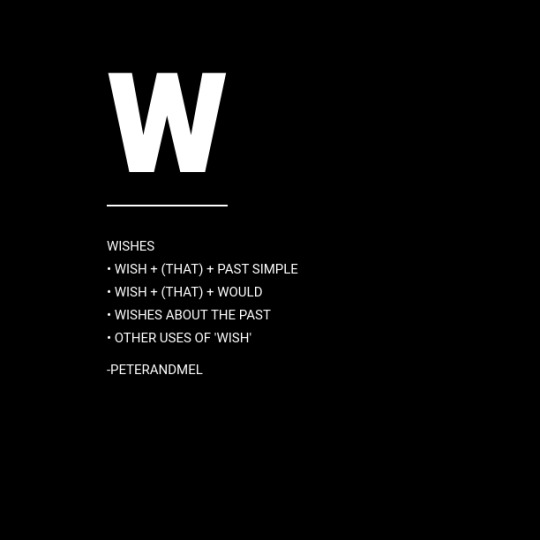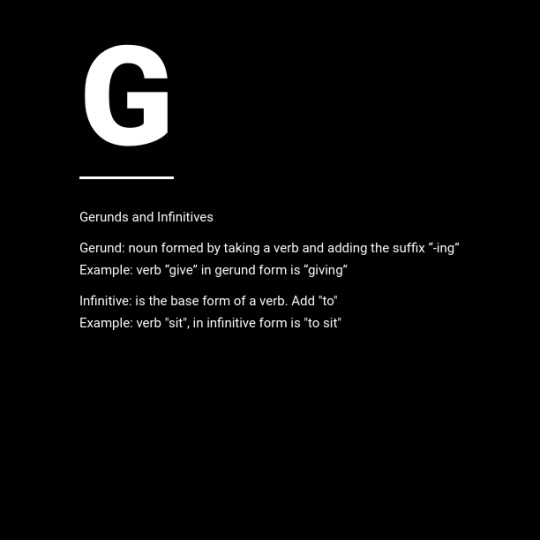Text
Index
Post
Present Simple
Simple Present exercises
Simple Present Verb Conjugation
Negative sentences for Simple Present Tense
Present Continuous Tense
Simple Past Tense
Simple Past vs. Past Continuous
Past Continuous Tense
Simple Future Tense
Future Tense practice
Future Time Clauses
Future Continuous Tense
Simple Present Passive
Simple Past Passive
Present Progressive Passive
Past Progressive Passive
Simple Future Passive
Going To Future Passive
Present Perfect Passive
Pasive voice with Modals
Gerunds and Infinitives
Conditionals
Wish
A good essay
Improve reading
After, before and when exercises
Videos
Reported Speech
Grammar
Don’t Swear!
Learn with movies
Pronunciation advices
How to use “THE”?
American and British pronunciation differences
Remember Vocabulary
Give your own opinion!
Basic Paragraph
1 note
·
View note
Video
youtube
Very important to know how handle with those words!
1 note
·
View note
Video
youtube
Reported Speech Video explained!
#Grammar#Easy#Easytense#English#ReportedSpeech#tips#CollectionOfGrammarTips#PeterandMel#Video#YouTube
1 note
·
View note
Photo

Uses
We can use 'wish' to talk about something that we would like to be different in the present or the future. It's used for things which are impossible or very unlikely.
We also use 'wish' with 'could' to talk about things in the present or future that we would like to be different. In this situation, 'could' is the past simple of 'can'.
Try this exercise: http://www.perfect-english-grammar.com/wish-exercise-1.html
We don't usually use 'wish' in this way for things that are really possible in the future. Instead, we use 'hope'
Wish + (that) + would:
On the other hand, we use 'would' with 'wish' in a little bit of a special way. It's generally used about other people who are doing (or not doing) something that we don't like and we want that person to change. It's not usually used about ourselves, or about something which nobody can change though, exceptionally, we do use it about the weather.
We don't usually use 'would' when there's no feeling that we want somebody to change their behaviour.
Wish + (that) + past perfect
We can use 'wish' with the past perfect to talk about regrets from the past. These are things that have already happened but we wish they'd happened in a different way. This use of 'wish' is very similar to the third conditional.
Wish + to + infinitive
We can use 'wish' with the infinitive to mean 'would like'. This is very formal. We don't usually use a continuous tense with 'wish' in this case.
Wish + object + to + infinitive
In the same way, we can use 'wish' with an object and an infinitive.
Wish + somebody + something:
This is used mostly in set phrases.
Here is even more practice for you: http://www.grammar-quizzes.com/condition4a.html
1 note
·
View note
Text
Conditionals
An intensive review about Conditionals -Real and Unnreal-, all explained and more practice for you! Click at this link and you will see it: http://www.englishpage.com/conditional/conditionalintro.html
0 notes
Photo

Gerund: Add and “ing” to the end of any verb
Infinitive: Add and “to” before the verb
Uses
Both gerunds and infinitives can be used as the subject or the complement of a sentence. However, as subjects or complements, gerunds usually sound more like normal, spoken English, whereas infinitives sound more abstract. In the following sentences, gerunds sound more natural and would be more common in everyday English. Infinitives emphasize the possibility or potential for something and sound more philosophical. If this sounds confusing, just remember that 90% of the time, you will use a gerund as the subject or complement of a sentence
As the object of a sentence, it is more difficult to choose between a gerund or an infinitive. In such situations, gerunds and infinitives are not normally interchangeable. Usually, the main verb in the sentence determines whether you use a gerund or an infinitive.
Some verbs are followed by gerunds as objects. Click at this link to see the list: http://www.englishpage.com/gerunds/gerund_list.htm
Some verbs are followed by infinitives. Click at this link to see the list: http://www.englishpage.com/gerunds/infinitive_list.htm
Gerunds can often be modified with possessive forms such as his, her, its, your, their, our, John's, Mary's, the machine's, and so on. This makes it clearer who or what is performing the action
Some verbs are followed by a noun plus an infinitive. In some situations, the noun is required. In other situations, the noun is optional. Click at this link to see the list: http://www.englishpage.com/gerunds/verb_noun_infinitive_list.htm
Some verbs are usually followed by a gerund, BUT they can also be followed by a noun plus infinitive. Using a noun plus infinitive will usually change who is performing the action. Click at this link to see the list: http://www.englishpage.com/gerunds/gerund_or_noun_infinitive_list.htm
There are many "go + gerund" expressions used for adventure sports and individual recreational activities. Click at this link to see the list: http://www.englishpage.com/gerunds/go_gerund.htm
Gerunds are used after prepositions. Most commonly, these are "verb + preposition" combinations. For reference, see the Verb + Preposition Dictionary and thePhrasal Verb Dictionary (click at the link). You don't have to memorize these resources, you just need to remember that gerunds are used after prepositions!
Remember that there are many "adjective + preposition" combinations and "noun + preposition" combinations in English as well. These are also followed by gerunds.List of Adjective + Preposition Combinations Followed by Gerunds and List of Noun + Preposition Combinations Followed by Gerunds. Once again, you don't have to memorize these resources, you just need to remember that gerunds are used after prepositions!
For Practice, link this page: http://www.englishpage.com/gerunds/index.htm
1 note
·
View note
Text
Passive Voice with Modals
A quick review about Passive Voice with Modals, with explanation and exercises for practice. Click at the link: http://www.grammarbank.com/passives-with-modals.html
0 notes
Text
Present Perfect Passive
A quick review about Present Perfect Passive, with explanation and exercises for practice. Click at the link: http://www.grammarbank.com/present-perfect-passive.html
0 notes
Text
Going To Future Passive
A quick review about Going To Future Passive, with explanation and exercises for practice. Click at the link: http://www.grammarbank.com/going-to-future-passive.html
0 notes